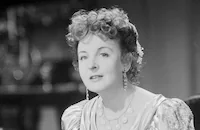Rosie
Brief Synopsis
Cast & Crew
David Lowell Rich
Rosalind Russell
Sandra Dee
Brian Aherne
Audrey Meadows
James Farentino
Film Details
Technical Specs

Synopsis
Mercenary daughters Mildred Deever and Edith Shaw contrive to cheat their widowed mother Rosie out of her millions. Alarmed by her purchase of the Los Angeles theater in which their father proposed, they incarcerate Rosie in an old age home and attempt to have her declared incompetent. To the widow's rescue, however, come granddaughter Daphne Shaw, old friend and lawyer Oliver Stevenson, and Stevenson's young assistant, David Wheelwright. At the trial the discouraged Rosie refuses to testify in her own defense. When Stevenson declares his love, however, she takes the stand, tricks her daughters into admitting her sanity, and wins the court's confidence.

Director
David Lowell Rich
Cast

Rosalind Russell

Sandra Dee

Brian Aherne

Audrey Meadows
James Farentino
Vanessa Brown

Leslie Nielsen

Margaret Hamilton

Reginald Owen

Juanita Moore

Virginia Grey
Dean Harens
Richard Derr
Harry Hickox
Eddie Ness
Hal Lynch

Ann Doran
Than Wyenn
Walter Woolf King
Ronald Chisolm

Doris Lloyd
Ron Stokes
Gene Roth
Kathleen O'malley
Doodles Weaver
Crew
Betty Abbott
John Anderson Jr.
Howard Bristol
Robert Daniels
William Dodds
Larry Germain
Joseph Gershenson
Stuart Gilmore
Alexander Golitzen
Ross Hunter
John Hussey
Joseph Kenny
Jean Louis
Jacque Mapes
Johnny Mercer
Melvin M. Metcalfe Sr.
Lyn Murray
Phil Parslow
Clifford Stine
Samuel Taylor
Universal Title
Harry Warren
Waldon O. Watson
George C. Webb
Ernest B. Wehmeyer
Bud Westmore
Max Wolk

Film Details
Technical Specs

Articles
Sandra Dee, 1944-2005
She was born Alexandra Cymboliak Zuck on April 23, 1944 (conflicting sources give 1942, but the actual birth year has been verified by the family) in Bayonne, New Jersey. She was abandoned by her father by age five, and her mother, Mary Douvan, lied about Sandra's age so that she could put her in school and get a job. She was only five when she entered the 2nd grade. Mature for her age, Sandra's mother kept the lie going when she began her modeling career. With her fetching blonde curls and pretty face, Dee found herself moving up quickly on the modeling ladder. By the time she was 10, she was one of the top child models in the country, and by age 13, she met producer Ross Hunter, who signed her to a seven-year contract for Universal. She had her named changed to Sandra Dee (a stage name combining her shortened first name and using her stepfather's surname initial D to sign vouchers) and made her film debut in Until They Sail (1957), starring Joan Fontaine, John Gavin.
Her next film, The Reluctant Debutante, a bubbly romantic comedy with Rex Harrison, Kay Kendall and John Saxon, proved Dee to be adept in light comedy. Yet she would prove her versatility as a performer the following year - 1959, when she scored in the three biggest films of the year:A Summer Place, a brooding melodrama with fellow teen-heartthrob, Troy Donohue; Imitation of Life, a glossy, Ross Hunter sudser; and of course Gidget, the archetypical, sand and surf movie. By the dawn of the '60s, Sandra Dee mania ruled the movie fanzines worldwide.
Her personal life took a surprising turn when she hooked up with singer Bobby Darin. She met Darin in 1960 in Portofino, Italy, where they were both cast in Come September with Rock Hudson and Gina Lollobrigida as the older romantic couple. They eventually married and she gave birth to a son, Dodd Mitchell Darin in 1961. All the while, Dee still plugged away with a series of hit films over the next few years: Romanoff and Juliet a charming satirical comedy directed by Peter Ustinoff; Tammy Tell Me True with John Gavin (both 1961; If a Man Answers (1962) a surprisingly sharp comedy of manners with husband Bobby Darin; Tammy and the Doctor, another corn-fed entry that was her leading man's Peter Fonda's big break; and Take Her, She's Mine (1963), a rather strained generation-gap comedy with James Stewart.
Her success was not to last. By the late `60s, as "youth culture" movies became more confrontational and less frivolous with references to open sexuality and drugs in the American landscape, Dee's career began to peter out. Her few films of that period : Rosie, and Doctor, You've Got To Be Kidding (both 1967) were pretty dreadful and were disasters at the box-office; and her divorce from Bobby Darin that same year, put a dent in her personal life, so Dee wisely took a sabbatical from the limelight for a few years.
The '70s actually saw Dee improve as an actress. Although by no means a classic, her role as woman falling pray to a warlock (Dean Stockwell) who sexually and psychologically dominates her in the The Dunwich Horror (1970), was nothing short of startling. Yet despite her competency as actress, her career never regained its footing, and she appeared in only a few television movies later on: The Daughters of Joshua Cabe (1972), Fantasy Island (1977).
Dee resurfaced in 1991, when she gave an interview with People magazine about her personal demons: molestation by her stepfather, anorexia, drug use and alcoholism, that had haunted her her entire life. That same year, much to the delight of her fans, she resurfaced briefly when she starred in a stage production of Love Letters at the Beverly Hill's Canon Theatre with her friend and former co-star, John Saxon. Since she was diagnosed with throat cancer and kidney failure in 2000, Dee had been in and out of hospitals for her failing health. She is survived by her son Dodd; and two granddaughters -Alexa and Olivia.
by Michael T. Toole

Sandra Dee, 1944-2005
Quotes
Trivia
The title song, "Rosie," was composer Harry Warren's final song contribution to a produced movie. The melody is actually a rework of a song, "Me And My Baby," with original lyrics by Sammy Cahn, that was written for, but not used in, the 'Lewis, Jerry' film Rock-a-Bye Baby (1958).
Miscellaneous Notes
c Technicolor
Techniscope













